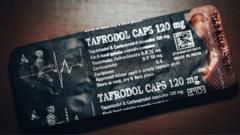Indian authorities have taken decisive action against the illegal export of two highly addictive opioids following a thorough investigation by the BBC that uncovered a public health crisis in parts of West Africa. The Drugs Controller General of India, Dr. Rajeev Singh Raghuvanshi, issued a letter noting that the permission to manufacture and export the harmful drug combination had been revoked.
The investigation pinpointed Aveo Pharmaceuticals as a key player in the distribution of a dangerous mix of tapentadol, a potent opioid, and carisoprodol, a muscle relaxant banned in Europe due to its addictive properties. In light of the findings, authorities have acted swiftly, raiding the Mumbai-based factory of Aveo and seizing its entire stock of the drugs.
Dr. Raghuvanshi’s circular, which cites the findings of the BBC investigation, mandated the immediate ban of all combinations of tapentadol and carisoprodol. The decision arrives after formal assessments indicated a significant potential for drug abuse and the severe impact these substances have had on populations in West Africa.
Despite their acknowledged dangers—breathing difficulties, seizures, and a high risk of overdose—these drugs have become popular, affordable street options in West Africa, especially in Nigeria, where around four million people are estimated to abuse opioids.
The BBC's investigation involved undercover filming that revealed Aveo's directors discussing the "business" of selling these highly addictive drugs to youth in Nigeria. During these exchanges, it became clear that the company's practices contributed significantly to the ongoing crisis.
Following the investigation, India's Food and Drug Administration confirmed that their actions included the seizure of all stock from Aveo and the halting of its production. They also emphasized their commitment to preventing any further illegal activities that would harm the country’s reputation. The FDA has promised continued inspections to prevent any future distribution of the banned substances.


















